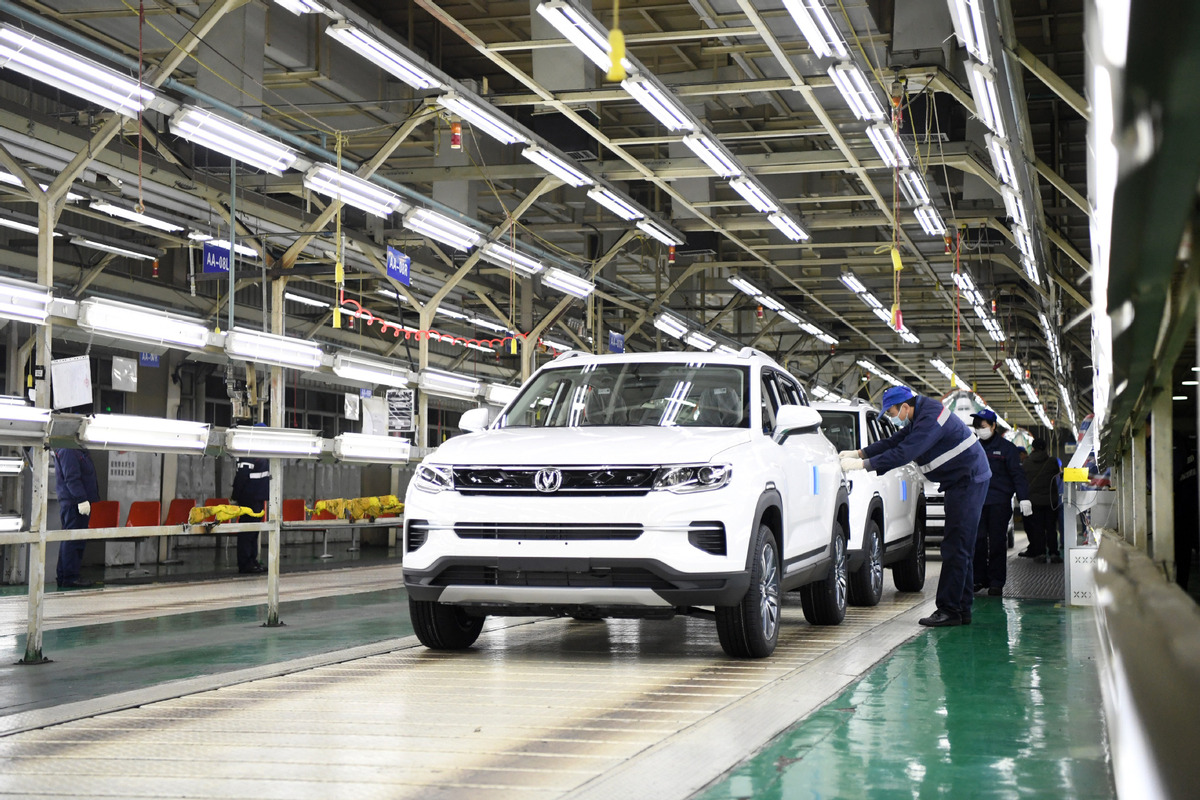

China has full confidence in its capability to maintain steady growth and long-term sound development while prevailing over the novel coronavirus epidemic.

Staff members work at a production line of Yubei plant of Chongqing Changan Automobile Co Ltd in Chongqing, Southwest China, Feb 18, 2020. [Photo/Xinhua]
The Chinese economy has shown resilience through decades of reform and opening-up. The country’s GDP was close to 100 trillion yuan, and its per capita GDP exceeded $10,000 in 2019. It contributed to over 30 percent of the world’s economic growth.
China also has a solid foundation for high-quality development thanks to its acceleration of industrial upgrading. The service industry contributed 59.4 percent to its economic growth. The growth in added value of large equipment manufacturing and high-tech manufacturing enterprises was much higher than that of large industrial enterprises as a whole, accounting for 32.5 percent and 14.4 percent, respectively.
Meanwhile, the country boasts a huge market and tremendous potential in domestic demand. China has 1.4 billion people and the world's largest middle-income group. Its domestic demand contributed to about 90 percent of its economic growth.
In addition, more companies have begun resuming production amid the coronavirus outbreak, as relevant supportive policies gradually take effect.
On the first day of work resumption, Shenzhen Pureatic Electronic Technology Co., Ltd. in south China’s Guangdong, delivered 1,500 cleaning robots to both domestic and overseas markets.
The company has received more orders than in the same period last year, as it always keeps a close eye on customers’ needs and upgrades its products, said Wei Tao, the company’s director of operations.
In addition, China's economy is in a transition from high-speed growth to high-quality development, and new economic growth areas are constantly emerging.
Wang Linfen, head of a specialized cooperative at Qiaotou town, south China’s Hainan province, worried that sweet potatoes left unsold as a result of the epidemic would go bad.
Fortunately, Wang found a ray of hope when Chinese e-commerce giant Pinduoduo launched an exclusive program to help farmers sell products online amid the epidemic on Feb. 10. Through the platform, Wang sold 22.8 tons of his products by Feb. 16.
Data from Pinduoduo shows that the program covers about 400 agricultural areas and over 230 national-level poverty-stricken counties, helping farmers sell 100,000 orders of overstocked agricultural products.
The turnaround reflects the rapid development of China’s online retail industry. International Monetary Fund (IMF) Managing Director Kristalina Georgieva expected a quick recovery for China's economy, as factories get back into gear and warehouses are resupplied.
 Fire brigade in Shanghai holds group wedding
Fire brigade in Shanghai holds group wedding Tourists enjoy ice sculptures in Datan Town, north China
Tourists enjoy ice sculptures in Datan Town, north China Sunset scenery of Dayan Pagoda in Xi'an
Sunset scenery of Dayan Pagoda in Xi'an Tourists have fun at scenic spot in Nanlong Town, NW China
Tourists have fun at scenic spot in Nanlong Town, NW China Harbin attracts tourists by making best use of ice in winter
Harbin attracts tourists by making best use of ice in winter In pics: FIS Alpine Ski Women's World Cup Slalom
In pics: FIS Alpine Ski Women's World Cup Slalom Black-necked cranes rest at reservoir in Lhunzhub County, Lhasa
Black-necked cranes rest at reservoir in Lhunzhub County, Lhasa China's FAST telescope will be available to foreign scientists in April
China's FAST telescope will be available to foreign scientists in April "She power" plays indispensable role in poverty alleviation
"She power" plays indispensable role in poverty alleviation Top 10 world news events of People's Daily in 2020
Top 10 world news events of People's Daily in 2020 Top 10 China news events of People's Daily in 2020
Top 10 China news events of People's Daily in 2020 Top 10 media buzzwords of 2020
Top 10 media buzzwords of 2020 Year-ender:10 major tourism stories of 2020
Year-ender:10 major tourism stories of 2020 No interference in Venezuelan issues
No interference in Venezuelan issues
 Biz prepares for trade spat
Biz prepares for trade spat
 Broadcasting Continent
Broadcasting Continent Australia wins Chinese CEOs as US loses
Australia wins Chinese CEOs as US loses